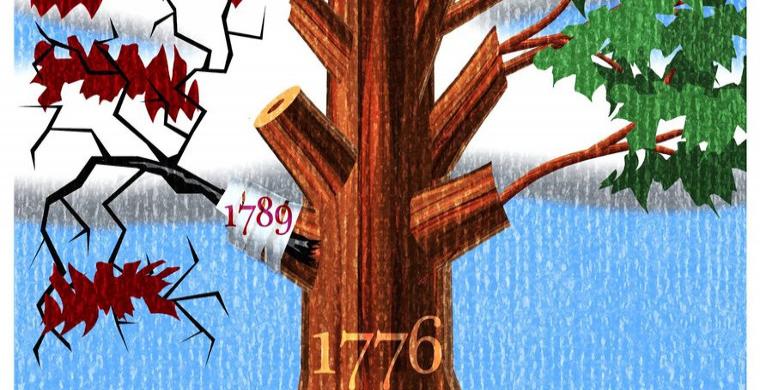'Can America survive Americans?'
ANALYSIS/OPINION:
By Os Guinness
https://www.washingtontimes.com/
April 8, 2019
Can America survive Americans? The American experiment is history's longest-running tutorial in the art of political freedom, but is it coming to an inglorious end -- and at the hand of Americans? With American public life sinking into conflict and squalor by the day, allow a visitor and an admirer to put in a word.
Before I came to the United States, "homecoming" to me was simply coming back to my family home, and I had to learn the deeper range of pride and emotions triggered by alumni returning to their alma mater. But as an answer to the present crisis I would like to call Americans back to the far deeper meaning of "homecoming" as it relates to the history and health of the American Republic.
The American Republic is as deeply divided now as at any time since just before the Civil War, but why? The conflict is far more than another episode of left against right, or "heartlanders" against "coastals," or "nationalists" and "populists" against "globalists." Nor is the problem simply the conflict between the "Trumpers" and the "Never Trumpers," for the resident is not the cause of the crisis, but its consequence. Whether Donald Trump serves out eight years or is impeached, the crisis remains, and it is the crisis that will decide the future of America.
Today's cultural conflicts cut deep because they touch on elemental differences: Between men and women, between races and between generations. Yet these primal conflicts have become lethal because they are inflamed by another division -- the chasm between those who understand the republic and freedom within the frame of the American Revolution and those who recast America and freedom within the frame of the French Revolution and its heirs such as Friedrich Nietzsche, Antonio Gramsci, Herbert Marcuse and Michel Foucault. Trace the roots of postmodernism, political correctness, identity politics, the extremes of the sexual revolution, the assaults on white privilege, the current rage for socialism, a host of other issues, and the trail leads back to "1789" and not to "1776."
It would be easy to analyze how this has happened. For example, Rudi Dutschke's 1968 call for a "long march through the institutions," seconded by Marcuse, has been strikingly successful, and the results can be gauged in the worlds of the colleges and universities, the press and media, and the world of entertainment. But what matters crucially is that "a house divided still cannot stand," and unlike the 1850s, there is no Lincoln-like leader addressing America's problems in the light of the Declaration of Independence and the "better angels" of the American nature.
Why "homecoming?" Many if not most Americans have forgotten that what George Washington called the "great experiment" in freedom owed everything, through the Reformation, to Mt. Sinai and not to Athens. Behind the U.S. Constitution stands the Hebrew covenant, and such American notions as freedom, the consent of the governed, ordered liberty, the separation of powers, owe everything to those whom Edmund Burke called "the Protestants of Protestantism" and the dissenters of dissent." As eminent scholars such as Daniel Elazar and Michael Walzer have shown, their politics was a massive rediscovery of the vision of Exodus and the "Hebrew republic." It owed nothing to the decisively different utopian anthropology and political style of the French Enlightenment and revolution.
The genius of covenantalism lay in its marked contrast with both hierarchical and organic forms of government, and its stress on such principles as the consent of the governed, and the reciprocal responsibility of all citizens for all citizens. Whereas democracy has zero social content, covenantalism and therefore constitutionalism is rich in social implications, such as responsibility and justice, and it depends crucially on transmission from generation to generation. Families, schools and civic education are therefore as crucial to American freedom as the military.
But like all forms of government, covenantalism/constitutionalism has its weaknesses as well as its strengths. What is clear in the Jewish story is that, whereas God keeps his promises, humans break theirs, so covenants grow weak and break down. For the Jews, that decline created the need for ongoing restoration and renewal. So whenever they were alienated from their roots, or were exiled physically, they could return home and "homecoming" was a full and rich recovery of the rationale for their very existence as a people. But as the prophets, Israel's social critics, insisted, true homecoming required teshuva, the radical about-turn of heart and mind that turned them from false paths and brought them back to their roots.
Time passes, and America's Founders were wise to provide the means of amending the U.S. Constitution. But they never foresaw what is needed today: A comprehensive national restoration and renewal of the Republic with an expanded understanding of "liberty and justice for all" to match modern conditions in America. The present crisis, then, poses a stark choice between two revolutions, with two decisively different outcomes. Is 1776 to be repealed and replaced by 1789? "Make America Great Again" can only happen if Americans understand what made America great in the first place.
But is such a homecoming possible, or is it too late? Is there a Lincoln-like leader in the land, and would such a call resonate with Americans today? At Gettysburg, Lincoln called for a "new birth of freedom." What is needed today is a "new new birth of freedom," but is there anyone who will speak up for America's "better angels" and will Americans listen? For America's admirers, these are uneasy times that "try men's souls" again.
Os Guinness is an Englishman, author and social critic. His latest book is "Last Call for Liberty: How America's Genius Has Become Its Greatest Threat."














